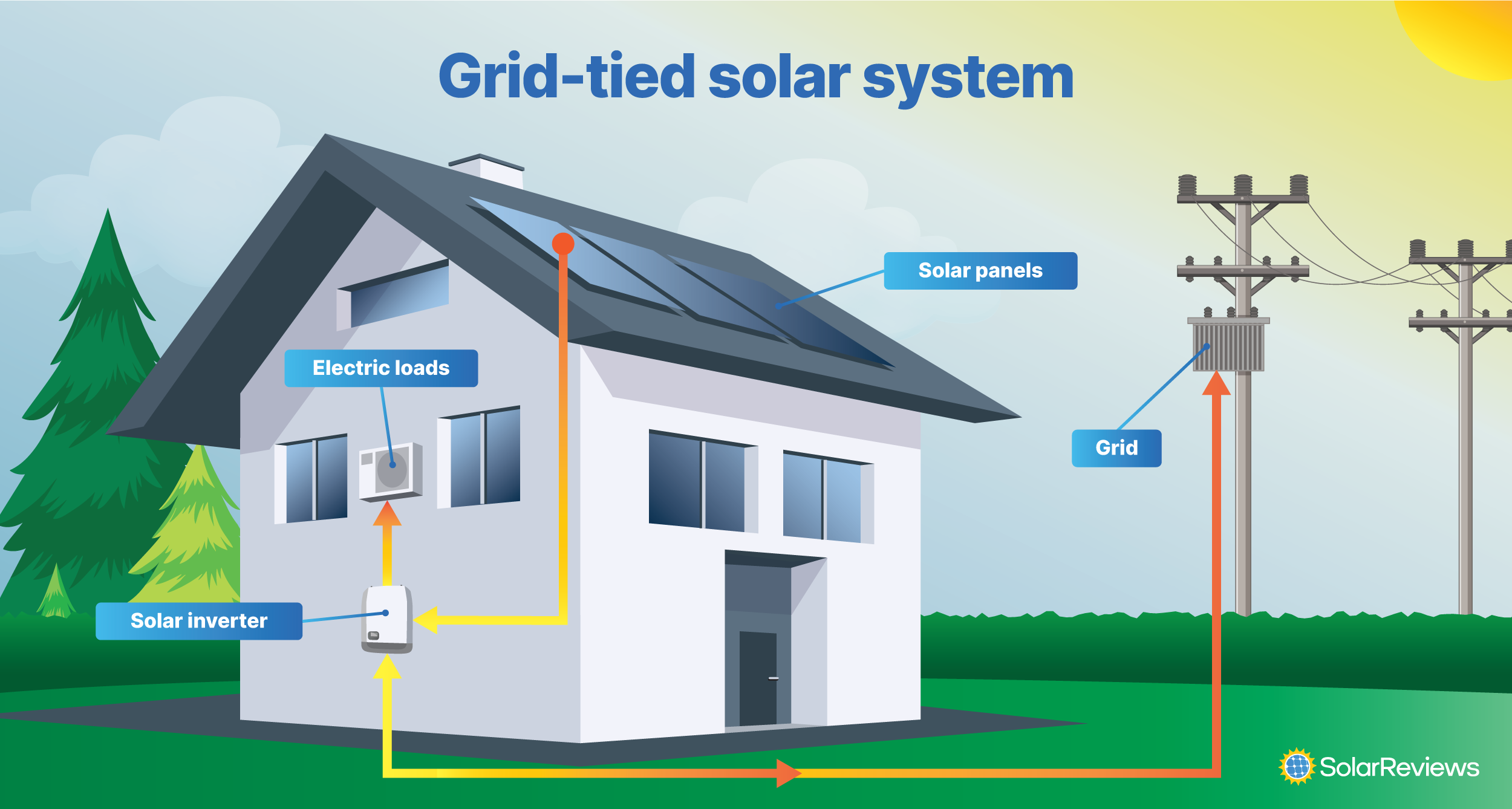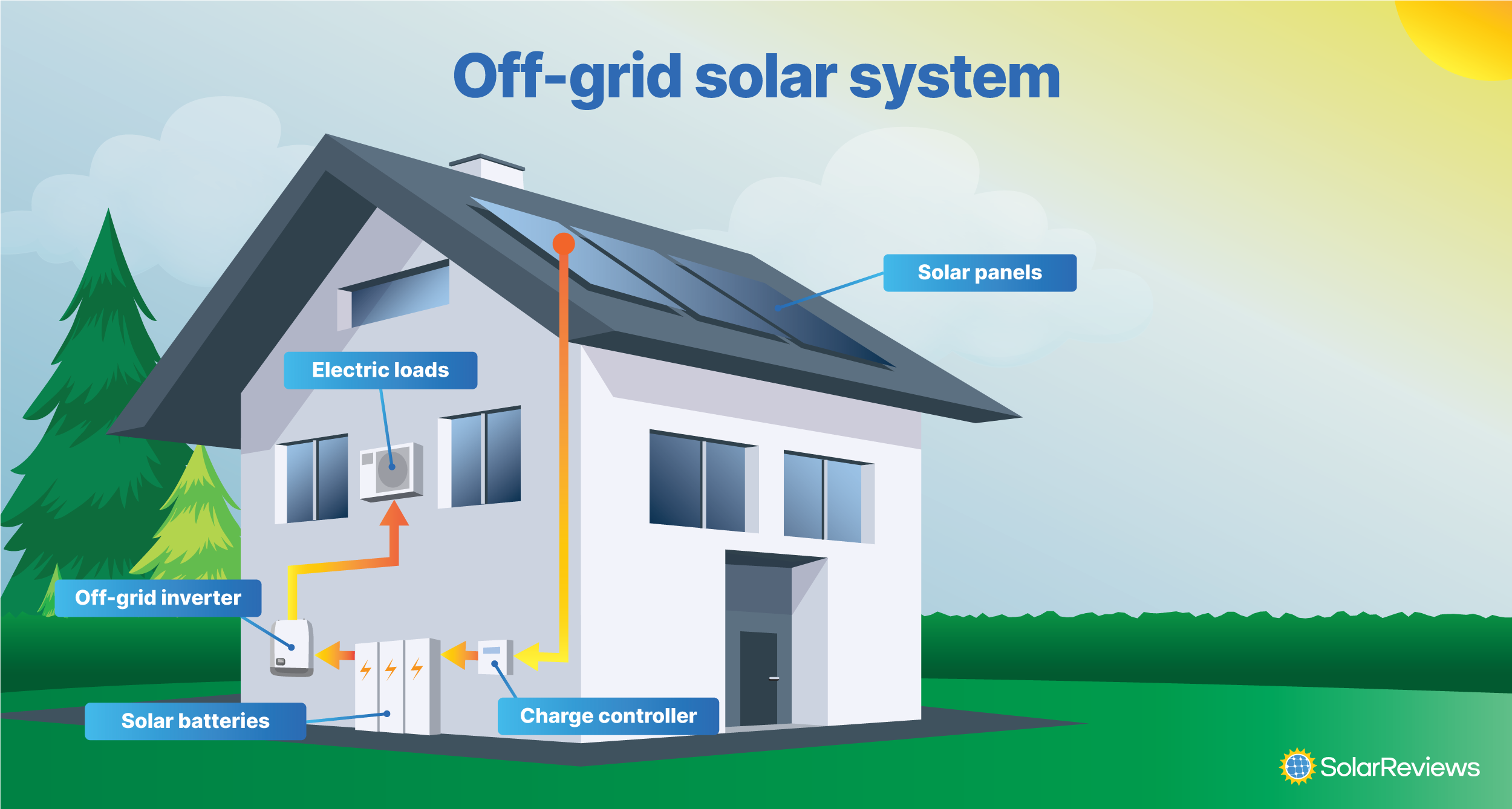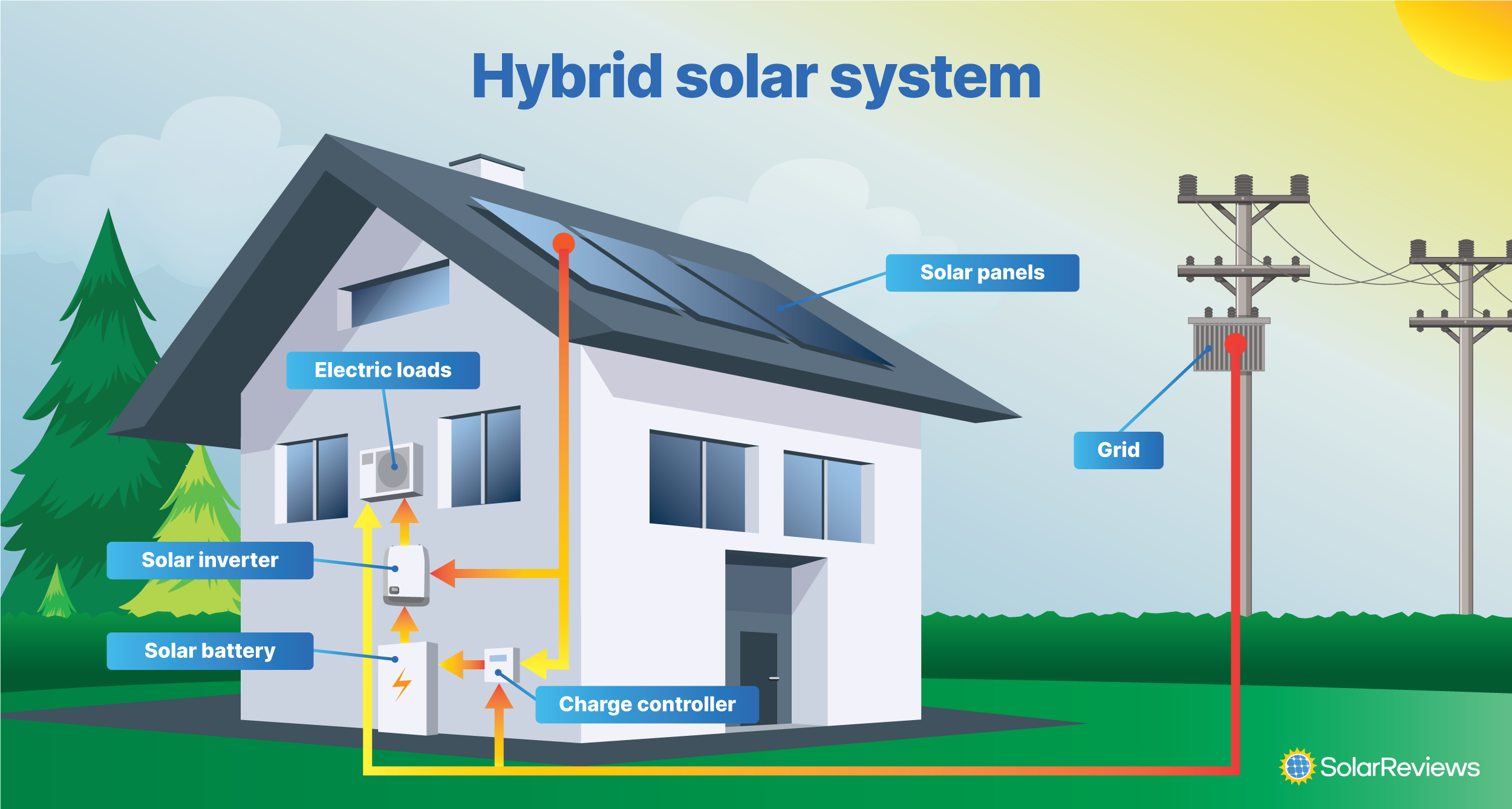Updated 3 months ago
Solar system types compared: Grid-tied, off-grid, and hybrid
Written by Zeeshan Hyder Zeeshan HyderZeeshan is a solar journalist who has long been passionate about climate issues and developed a deep interest in solar power after witnessing its succ...Learn more , Edited by Catherine Lane Catherine LaneCatherine has been researching and reporting on the solar industry for five years and is the Written Content Manager at SolarReviews. She leads a dyna...Learn more

Why you can trust SolarReviews
SolarReviews is the leading American website for solar panel reviews and solar panel installation companies. Our industry experts have a combined three decades of solar experience and maintain editorial independence for their reviews. No company can pay to alter the reviews or review scores shown on our site. Learn more about SolarReviews and how we make money.
There are three types of solar panel systems: grid-tied (on-grid), off-grid, and hybrid solar systems.
Each type of system has a unique setup that affects what equipment is used, the complexity of installation, and, most crucially, your potential costs and savings.
What would be the best in your situation? Let’s take a closer look at the pros and cons of different solar system types.
Grid-tied
Hybrid
Off-grid
Grid-tied solar system
A grid-tied system is the most common type of solar system. It has no solar battery for backup power and utilizes net metering to maximize savings. Solar panels are mounted on your roof then wired together, and the power generated flows into an inverter where direct current (DC) electricity is converted into alternating current (AC) electricity. This electricity is either used by your home or is exported to the utility grid.
Grid-tied solar systems

Grid-tied systems are solar panel installations that are connected to the utility power grid. With a grid-connected system, a home can use the solar energy produced by its solar panels and electricity that comes from the utility grid.
If the solar panels generate more electricity than a home needs, the excess is sent to the grid. In some places, a utility will purchase the solar energy sent to the grid in the form of a bill credit to offset future electricity costs thanks to a billing structure called net metering.
Grid-tied solar panel systems are so popular because they provide the best value for how much they cost, especially in areas with full-retail net metering. Their cost is low because they require less equipment than other solar system types. However, this also means grid-tied systems can’t keep your lights on when the power is out.
Pros
Cheapest home solar system
Less equipment
Cons
No backup power
How much do grid-tied solar panel systems cost
How much do grid-tied solar panel systems cost?
You can expect to pay about $20,000 for an average-sized grid-tied solar panel system before incentives. The price drops to about $14,000 when you take the federal solar tax credit into account. Grid-connected solar systems are usually the cheapest way to go solar. The overall cost of a solar system will depend on its size and the installer you choose.
System size | Estimated cost | Estimated cost after tax credit |
|---|---|---|
4 kW | $12,000 | $8,400 |
6 kW | $18,000 | $14,000 |
8 kW | $24,000 | $16,800 |
10 kW | $30,000 | $21,000 |
12 kW | $36,000 | $25,200 |
14 kW | $42,000 | $29,400 |
What equipment does a grid-tied solar system use?
Grid-tied solar systems require the least amount of equipment. Most grid-tied solar systems consist of:
1. Standard solar equipment: Solar panels, racking, and wiring are needed for all solar systems.
2. Grid-tied inverters: Either one string inverter or a microinverter for each panel to convert solar energy into usable electricity that can be used by your home or sent to the utility.
3. Updated electric meter: Your utility will likely give you a new electricity meter to track how much electricity your solar panels produce and how much energy your home uses. Sometimes, they’ll install one meter that measures both; other times, you may get a second meter in addition to your existing one that just measures solar production.
Best uses for grid-tied solar systems
Grid-tied solar panel systems are best for homeowners with access to full-retail net metering and don’t experience frequent power outages.
With true net metering, a grid-tied system can earn the best solar savings of all the system types because the equipment costs are low. Net metering bill credits fully offset the energy used when the solar panels aren’t generating electricity, like at night.
Off-grid solar systems

An off-grid solar system is a solar panel system that has no connection to the utility grid at all. To keep a house running off-grid, you need solar panels, a significant amount of battery storage, and usually another backup power source, like a gas-powered generator.
Sometimes called standalone systems, they’re common among homeowners who don’t have access to the grid, like in rural areas or remote cabins.
Believe it or not, there are plenty of places throughout the country that the utility grid doesn’t service. Off-grid systems give these remote areas access to electricity. Being off-grid also makes you more self-reliant; you’re not beholden to a utility company, and the power is in your hands.
But, off-grid systems are very expensive. You need a lot of battery storage to power an entire home without help from the grid, and the cost adds up. Going off-grid also requires certain lifestyle changes. You have to be very energy-conscious when you don’t have a grid with unlimited supply. Off-grid homeowners need to monitor their consumption and solar production to ensure they have the electricity needed.
Pros
Provides electricity where there is no grid access
Self-reliant
Cons
Very expensive
Requires lifestyle changes
How much do off-grid solar panel systems cost?
Off-grid solar installations cost between $50,000 and $65,000 on average. That’s over $30,000 more expensive than a grid-tied system.
The bulk of the expense comes from the battery storage, which will likely run a minimum of about $20,000 just for the equipment. This number could be even higher depending on what appliances you need to run in your home.
Sometimes, people opt for a DIY solar installation when they go off-grid to save on installation costs. While you may cut down on the price, installing a solar system is dangerous work and should only be performed if you feel absolutely confident you have the necessary skills to get the job done.
What equipment do off-grid solar systems use?
Typical off-grid solar systems require the following components:
1. Standard solar equipment: Solar panels, racking, and wiring are used in all solar systems. Off-grid systems often use ground-mounted arrays, which are mounted differently than rooftop panels.
2. Solar batteries: Solar batteries store solar energy for a home to use later when the solar panels aren’t generating enough electricity to cover all household needs. Off-grid systems often use lead-acid batteries, but lithium-ion batteries can also be used.
3. Solar charge controller: A charge controller is located between the panels and the battery, preventing the battery from being overcharged.
4. Off-grid inverter: Inverters convert DC electricity generated by solar panels into AC electricity that your home appliances can use. Off-grid inverters don’t have to match phase with the utility since they aren’t connected to the grid.
5. Additional DC disconnect: All solar panels have AC and DC safety disconnects, but off-grid systems have one additional DC disconnected between the battery and the off-grid inverter. The disconnect switch will stop current from flowing between the two and is important for maintenance and protection from electrical fires.
6. Backup generator (optional): Because off-grid systems don’t have any connection to the grid, they often use backup gas generators and battery systems to ensure there’s an additional power source, just in case.
Best uses for an off-grid solar system
Off-grid solar systems are not for the faint of heart. You should only consider off-grid solar if you don’t have grid access in your area and are prepared for the lifestyle and expenses that come with it. Solar powered tiny homes are a feasible use for off-grid solar systems. Their small size calls for lower energy usage and tiny homes can be used for an environmentally-friendly getaway.
It’s also important to keep in mind that going off-grid might be illegal in some places. If utility service is available near you, there may be laws preventing you from, or making it very difficult to, go off the grid.
Hybrid solar systems

Hybrid solar systems combine the best of grid-tied and off-grid solar systems; the solar panels are attached to batteries and the utility grid. You’ll commonly see hybrid solar systems referred to as “solar-plus-storage” systems.
Solar-plus-storage systems are popular in areas that experience frequent grid failures or in places that don’t have full-retail net metering. Without a battery, solar panels can't run your home when the power goes out. Batteries also allow you to rely less on the grid by using stored energy when your solar panels aren’t producing electricity. This also maximizes the amount of clean energy your home uses!
Plus, batteries can even save a bit more money if you don't have access full retail net metering. However, the high upfront cost of batteries means they often don't pencil out financially.
Here are some of the pros and cons of installing a hybrid solar-plus-storage system
Pros
Provide backup power
Increase energy independence
Can potentially save more money on electricity bills
Cons
Expensive
Not always the right financial choice
How much do hybrid solar systems cost?
An average hybrid solar panel system will cost at least $32,000. The total cost will depend on your system size and the battery you install. For example, the Tesla Powerwall costs about $14,000 to install, while a Generac PWRcell system could cost closer to $18,000.
The good news is that batteries do qualify for the 30% federal tax credit, and there are a number of local battery rebates and incentive programs opening across the country to help reduce battery installation costs.
The following table outlines the estimated cost of different-sized solar systems with one battery.
System size | Estimated cost before tax credit | Estimated cost after tax credit |
|---|---|---|
4 kW | $26,000 | $18,200 |
6 kW | $32,000 | $22,400 |
8 kW | $38,000 | $26,600 |
10 kW | $44,000 | $30,800 |
12 kW | $50,000 | $35,000 |
14 kW | $56,000 | $39,200 |
What equipment do hybrid solar systems use?
Hybrid solar systems use similar equipment to a grid-tied solar system but also include the components necessary to connect a battery. Here is some of the equipment commonly used in a solar-plus-storage system.
1. Standard solar equipment: Solar panels, racking, and wiring are key parts of all solar installations.
2. Solar battery: The solar battery in a hybrid system can store excess solar energy produced by solar panels and also charge from the grid. Lithium-ion batteries are most common for residential hybrid solar systems.
3. Hybrid inverter: Hybrid inverters convert energy from the solar panels, batteries, and the grid so they can work in tandem. Some home solar batteries have the inverter built-in to the unit.
4. Charge controller: The charge controller prevents the battery from overcharging and keeps it operating safely.
5. Additional DC disconnect: Hybrid solar systems have an additional DC disconnect switch between the battery and the inverter to prevent current from flowing between the two.
6. Updated electric meter: Your utility may install a new or additional electric meter on your property to track your energy usage from the grid and your solar production.
Best uses for a hybrid solar system
Hybrid solar systems are best for homeowners in areas that don’t have full retail net metering or that experience frequent and prolonged power outages.
A solar-plus-storage system may also be worthwhile if your government or utility company offers battery rebates or incentives, like a virtual power plant program.
How to pick the best solar system for you
A simple grid-tied system will usually be the best financial choice. Grid-tied systems generally provide the best return on investment because of their low upfront cost and simple system design.
However, there are some cases where a hybrid system may make the most sense for you, especially if you experience regular power outages. If you really value energy independence and maximizing the amount of renewable energy your home uses, then a solar plus storage system could be just what you’re looking for.
Off-grid systems are probably the least practical for everyday homeowners. But they are excellent for remote areas and may be the right choice for your mountain cabin.
The best way to figure out the right solar system for you is by contacting solar companies near you. Local solar installers will have the best understanding of the right solar system to install in your area and how you can get the most out of your solar panels.
Additional options for solar
Zeeshan is a solar journalist who has long been passionate about climate issues and developed a deep interest in solar power after witnessing its successful adoption in Australia. He has previously worked as a journalist for a major news organization, covering energy, climate, and environmental stories, among other topics. He also served as an organizer for the Pakistan Youth Climate Network, an advocacy group aimed at raising climate awareness...
Learn more about Zeeshan Hyder